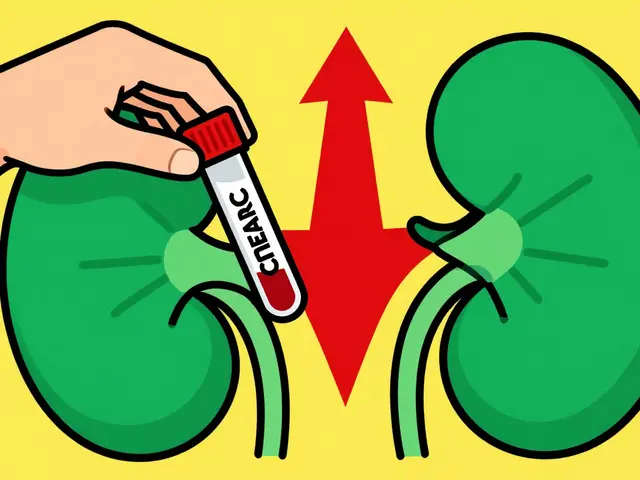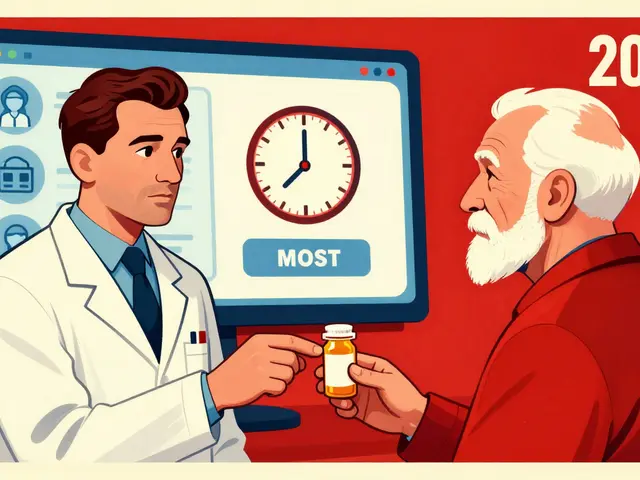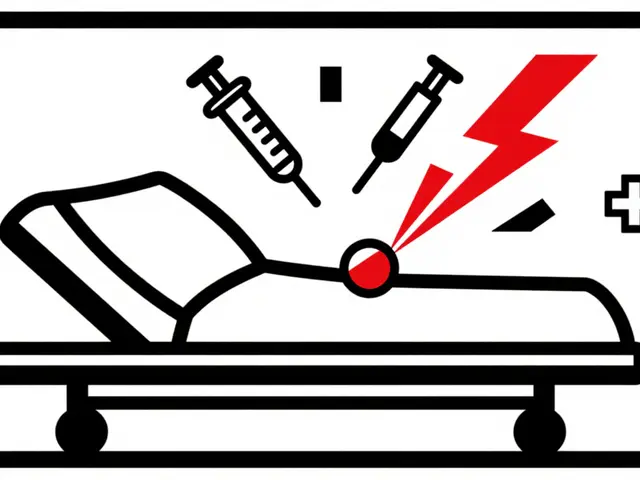Introduction: The Need for Natural Alternatives to Doxepin
As someone who has experienced depression and anxiety, I understand how important it is to find effective treatments. Doxepin, a tricyclic antidepressant, has been prescribed to many people dealing with these conditions. However, like many other medications, it comes with its own set of side effects and may not be suitable for everyone. That's why I decided to explore natural alternatives to Doxepin that can help alleviate the symptoms of depression and anxiety without the potential drawbacks of prescription medication. In this article, I will share with you nine natural options that may help you find relief and improve your mental health.
1. St. John's Wort: A Herbal Remedy with Antidepressant Effects
St. John's Wort (Hypericum perforatum) is a well-known herbal remedy for depression. It has been used for centuries to treat various mental disorders and is now widely recognized for its antidepressant effects. Several studies have shown that St. John's Wort is as effective as standard antidepressants, including Doxepin, in treating mild to moderate depression. The herb is available in various forms, such as capsules, tablets, and teas. However, it is essential to consult with your healthcare provider before using St. John's Wort, as it can interact with other medications and may cause side effects in some people.
2. Omega-3 Fatty Acids: Essential Nutrients for Brain Health
Omega-3 fatty acids are essential nutrients that play a crucial role in brain health and function. They are found in fatty fish, such as salmon, mackerel, and sardines, as well as in some plant sources like flaxseeds and walnuts. Research has shown that people with depression and anxiety may have lower levels of omega-3 fatty acids in their bodies. Supplementing with omega-3s has been found to improve symptoms of both conditions, making them a potential natural alternative to Doxepin. To reap the benefits of omega-3 fatty acids, consider adding more omega-3 rich foods to your diet or taking a fish oil supplement.
3. SAMe: A Natural Compound with Antidepressant Properties
S-adenosylmethionine, or SAMe, is a naturally occurring compound in the body that plays a vital role in various biochemical processes. It has been found to have antidepressant effects and may help reduce symptoms of depression and anxiety. Several studies have shown that SAMe is as effective as some prescription antidepressants, including Doxepin, in treating depression. SAMe supplements are available in various forms, such as capsules and tablets. However, it is essential to consult your healthcare provider before using SAMe, as it may interact with other medications and cause side effects in some people.
4. 5-HTP: A Precursor to Serotonin
5-Hydroxytryptophan (5-HTP) is a naturally occurring amino acid that the body converts into serotonin, a neurotransmitter that plays a significant role in mood regulation. Low serotonin levels have been linked to depression and anxiety, and some studies have shown that 5-HTP supplements can help alleviate symptoms of both conditions. 5-HTP may be a viable natural alternative to Doxepin for those looking to boost their serotonin levels and improve their mood. However, it is crucial to consult your healthcare provider before using 5-HTP, as it may interact with other medications and cause side effects in some people.
5. Magnesium: An Essential Mineral for Mental Health
Magnesium is an essential mineral that plays a critical role in over 300 biochemical reactions in the body. It is involved in many processes that affect mood and brain function, and studies have shown that low magnesium levels are associated with depression and anxiety. Supplementing with magnesium has been found to improve symptoms of both conditions, making it a potential natural alternative to Doxepin. Magnesium can be found in various foods, such as dark leafy greens, nuts, seeds, and whole grains, or can be taken as a supplement.
6. B Vitamins: Supporting Mental Well-being
B vitamins, particularly B6, B9 (folic acid), and B12, are essential for the proper functioning of the brain and nervous system. They play a crucial role in the production of neurotransmitters, such as serotonin, which helps regulate mood. Deficiencies in B vitamins have been linked to depression and anxiety, and supplementing with these vitamins has been found to improve symptoms of both conditions. B vitamins can be found in various foods, such as whole grains, meat, dairy products, and leafy green vegetables, or can be taken as a supplement.
7. Valerian Root: A Natural Remedy for Anxiety and Insomnia
Valerian root (Valeriana officinalis) is a herbal remedy that has been used for centuries to treat anxiety and insomnia. It is believed to work by increasing the levels of a neurotransmitter called gamma-aminobutyric acid (GABA) in the brain, which has a calming effect on the nervous system. Some studies have shown that valerian root can help reduce symptoms of anxiety and improve sleep quality, making it a potential natural alternative to Doxepin for those struggling with anxiety and sleep issues. Valerian root is available in various forms, such as capsules, tablets, and teas. However, it is essential to consult your healthcare provider before using valerian root, as it may interact with other medications and cause side effects in some people.
8. Exercise: Boosting Mood and Reducing Stress
Regular exercise has been found to have numerous benefits for mental health, including improving mood and reducing stress. It is believed that exercise increases the production of endorphins, the body's natural feel-good chemicals, and stimulates the release of neurotransmitters, such as serotonin and dopamine, which help regulate mood. Engaging in regular physical activity can be an effective natural alternative to Doxepin for managing depression and anxiety. Aim for at least 30 minutes of moderate-intensity exercise, such as brisk walking, swimming, or cycling, most days of the week to experience the mood-boosting benefits of exercise.
9. Mindfulness and Meditation: Cultivating Mental Well-being
Mindfulness and meditation practices have been found to have numerous benefits for mental health, including reducing symptoms of depression and anxiety. These practices involve focusing the attention on the present moment and cultivating an attitude of non-judgmental awareness. Regularly practicing mindfulness and meditation can help improve emotional regulation, increase self-awareness, and promote relaxation, making them effective natural alternatives to Doxepin for managing mental health. There are various mindfulness and meditation techniques available, such as breath awareness, body scan, loving-kindness meditation, and yoga, which can be easily incorporated into your daily routine.
In conclusion, there are several natural alternatives to Doxepin available for those looking to manage their depression and anxiety without prescription medication. It is essential to consult your healthcare provider before trying any of these options, as they may interact with other medications or cause side effects in some people. With the right approach and support, you can find relief from your symptoms and improve your mental health naturally.







Katie Wilson
May 17, 2023 AT 10:03St. John's Wort is a joke. I tried it for three weeks and ended up with a sunburn that looked like I'd been tanning under a UV lamp while wearing a bikini. Also, it made my SSRIs useless. Don't be that person.
Denise Wood
May 18, 2023 AT 13:09Omega-3s are backed by solid meta-analyses-Cochrane reviews show moderate effect sizes for depression, especially EPA-dominant formulations. Dose matters: 1-2g EPA daily. Also, flaxseed ALA doesn't convert well in most people, so fish oil is the real deal. Check your lab values before supplementing.
Erick Horn
May 20, 2023 AT 12:31Exercise? Really? That’s your solution? Wow. Groundbreaking.
Lidia Hertel
May 22, 2023 AT 12:26I was suicidal last year and tried all of these. Magnesium glycinate + daily walks + 10 mins of breathwork changed my life. Not a magic bullet, but together? It’s like slowly turning on a dimmer instead of flipping a switch. You don’t need to be fixed-you just need to keep showing up. I’m still here. You can be too. 💛
Amy Reynal
May 23, 2023 AT 05:36Okay but let’s be real-this whole list reads like a wellness influencer’s Pinterest board with a PubMed tab open. I love that you included SAMe and 5-HTP, but did you mention that in the EU, 5-HTP is a controlled substance because of serotonin syndrome risks? And SAMe? It’s literally a pharmaceutical in Germany. We’re not ‘going natural’-we’re just shopping for unregulated chemicals with fewer FDA labels. Also, mindfulness? Cool. But if you’re homeless, traumatized, or working three jobs, telling someone to ‘just meditate’ is like telling a drowning person to ‘just breathe.’ Context matters. 🙃
Andrew Butler
May 24, 2023 AT 08:04st johns wort = cytochrome p450 nightmare. you think you're being holistic but you're just gonna get your warfarin or birth control fucked up. also valerian root? it's a benzo mimic. you're just self-medicating with herbal benzos. nobody talks about that. also-exercise is placebo. endorphins don't last. dopamine is the real key. and you didn't even mention tyrosine. lmao.
Varun Gupta
May 26, 2023 AT 02:52Also, why no mention of glyphosate destroying your gut microbiome and thus your serotonin? 🌱💊 #Chemtrails
Kelley Akers
May 26, 2023 AT 05:04It’s fascinating how people treat natural remedies like they’re morally superior to pharmaceuticals. You wouldn’t take a home-brewed antibiotic for sepsis, so why treat depression like it’s a spiritual imbalance? St. John’s Wort isn’t ‘natural healing’-it’s pharmacologically active, poorly regulated, and potentially lethal in combination. Your virtue signaling isn’t helping your serotonin levels. Just take the damn SSRIs and go to therapy.
Chris Bock
May 26, 2023 AT 12:38The mind is not a machine. You can't optimize serotonin like a battery. You're trying to fix the soul with supplements.